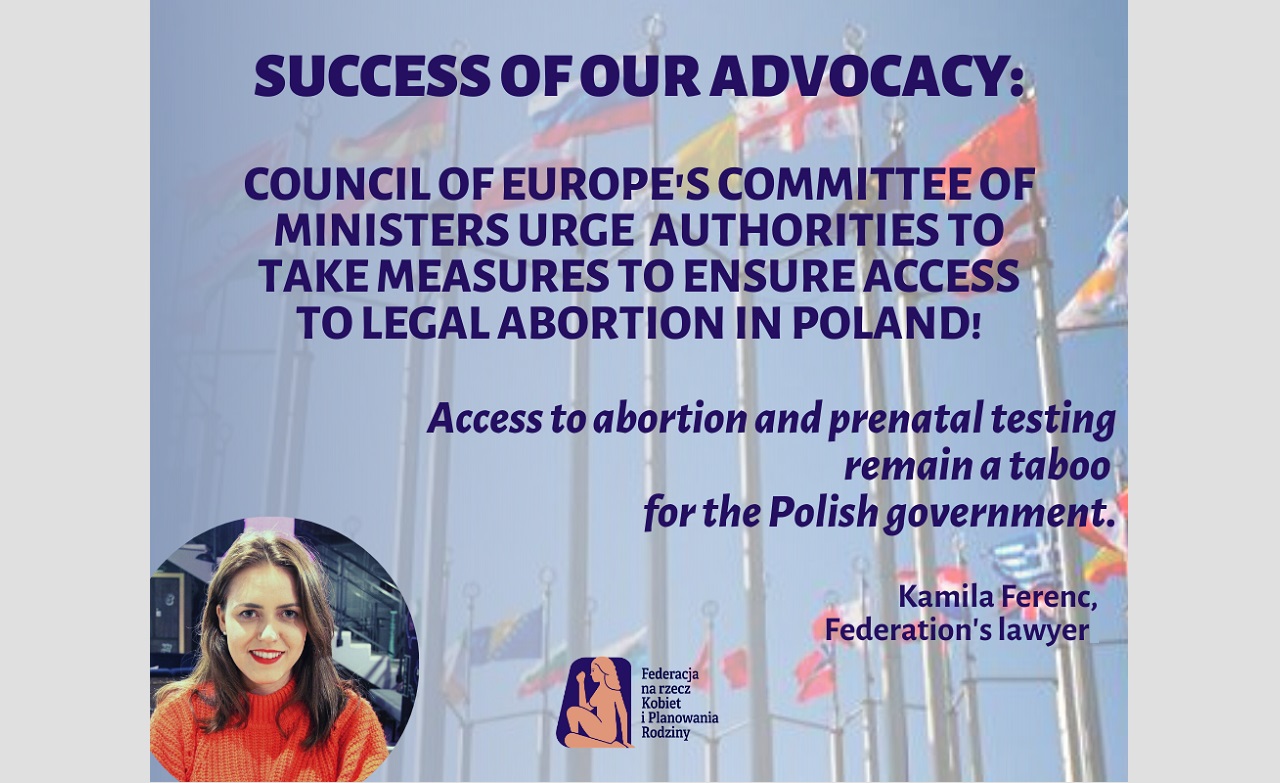At the beginning of March 2020, the Council of Europe’s Committee of Ministers examined (lack) of progress in the execution of 3 judgments of the European Court of Human Rights against Poland concerning some important aspects of access to basic SRHR services. The oldest judgment was issued in 2007 which makes 13 years of the pathetic execution process.
The Committee adopted the following decisions in these cases: Tysiąc (2007)[1], R.R.[2] (2011), P. and S. (2013)[3] relying largely on the reports of the Federation for Women and Family Planning and the Polish Commissioner for Human Rights.
The Committee of Ministers stated that there was no progress or new information provided by the Polish government in the recent reports. It urged Poland to take the following actions:
- ensure pregnant women with the procedural mechanism to effectively contest decisions of doctors denying lawful abortion;
- provide explicitly that a healthcare provider has an obligation to provide information to patients on how to obtain healthcare services which were not performed due to the use of the conscience clause and strongly encouraged the adoption of such an amendment without further delay;
- guarantee clear and effective procedures ensuring that women seeking lawful abortion are provided with adequate information on the steps they need to take, including in the event of a refusal by a doctor to perform an abortion on grounds of conscience and urged the authorities to adopt such procedures without further delay; such procedure should be free of unnecessary requirements (such as obligatory psychological consultation);
- provide information, including statistical data, about the availability of lawful abortion across the country, together with an assessment of possible regional disparities in this regard;
- provide information, including statistical data about hospitals refusing to perform lawful abortion due to the use of the conscience clause by medical staff;
- ensure the effective functioning of the mechanism based on the liability of healthcare providers for breach of their contractual obligation to provide lawful abortion and to provide the Committee with examples of concrete action in this respect.
Given the gravity of the violations found by the European Court in these cases and lack of substantial progress in addressing the most crucial issues, the Committee might wish to instruct the Secretariat to prepare a draft interim resolution for its next examination of this case at the DH meeting in March 2021 at the latest, should the situation remained unchanged by the end of September 2020.
Federation will continue its monitoring and advocacy in hope that Polish government wakes up and acknowledge in action the importance of the recommendations in question for Polish women and their reproductive rights.
Kamila Ferenc, the Federation’s lawyer, who took part at the briefing for the Committee of Ministers in Strasbourg says:
„This is a clear illustration of how women’s health and needs are approached in Poland. In other fields, the government at least shows some attempts to improve the situation. Unfortunately, access to abortion and prenatal testing remains a taboo in Poland and since almost two decades nothing changes. Women are sent back and forth from one hospital to another and have no support at all, they can’t even effectively challenge the refusals of services. The worldview of the doctors is more important from their rights. Hospitals establish internal procedures which are violating laws and discourage women to stand up for their rights”.
Media contact:
Kamila Ferenc – Lawyer, Coordinator of a Legal Team
prawniczka@federa.org.pl
[1] The Tysiąc case concerned a woman whose health was placed at risk in the course of a pregnancy and who was entitled to abortion care under Polish law as a result. The European Court found that due to obstructive behavior of medical professionals and the absence of an effective and timely complaints mechanism, she was denied access to abortion care and had no choice but to continue the pregnancy, suffering serious damage to her health as a result.
[2] The R.R. case concerned a woman who was denied access to legal prenatal testing services and legal abortion care in Poland as a result of obstructive and harmful behavior by medical professionals and personnel. The European Court found that the behavior of the Polish authorities and medical professionals placed her in an extremely vulnerable position and denied her access to health care to which she was entitled under Polish Law.
[3] The P. and S. case concerned an adolescent girl who was legally entitled to an abortion in Poland after she became pregnant due to sexual assaulted. However, the European Court found that the girl and her mother encountered repeated arbitrary and harmful behavior by medical professionals and other state authorities which severely hampered their ability to secure access to legal abortion care.

